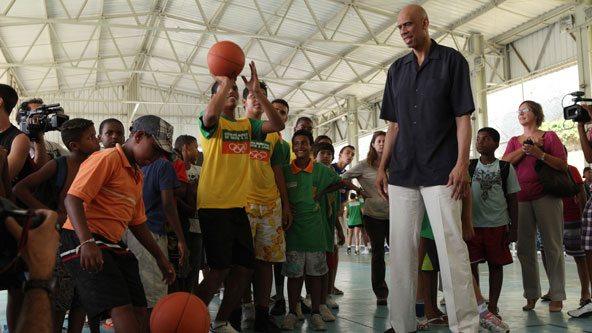By MAUREEN MACKEY, The Fiscal Times
Kareem Abdul-Jabbar may be best known as one of professional basketball’s all-time greatest players – the 7-foot-2 Hall of Fame center and former Laker, with his iconic skyhook shot, dominated the NBA for 20 years and is still the league’s top scorer today, with 38,387 points.
But for decades he’s had an abiding interest in education and in making history come alive through books and documentaries – especially the achievements of African-Americans. He’s written about black Americans’ inventions, their contributions to the Harlem Renaissance, and their participation in World War II.
Two years ago he co-wrote the documentary, On the Shoulders of Giants, which highlighted the impact of the basketball team affectionately known as the Harlem Rens. The team battered rampant racism during Harlem’s cultural revolution and in 1939 became the first all-black team to win a world professional title in any sport – paving the way for integrated basketball teams.
Last year Abdul-Jabbar was appointed U.S. Cultural Ambassador by Secretary of State Hillary Rodham Clinton, who tasked him with leading conversations with young people about education and social and racial tolerance. He was also named California’s STEM Education (Science, Technology, Engineering & Mathematics) Afterschool Ambassador, and has written a children’s book, What Color Is My World: The Lost History of African-American Inventors. Diagnosed with Philadelphia chromosome-positive chronic myeloid leukemia (Ph+CML) in 2008, he’s also an advocate for cancer research.
The Fiscal Times spoke with him this week as the nation continues its February observance of Black History Month.
The Fiscal Times (TFT): You’ve worked for years to further an understanding of the contributions of African-Americans in many fields. What’s behind this?
Kareem Abdul-Jabbar (KAJ): I’m just trying to fill in the gaps that our textbooks sometimes miss. My books focus on the contribution that African-Americans have made to American culture. We have to be aware of the limitations of our educational system and, instead of just complaining, do something to help it along. Teach them that black men and women helped make that light bulb glow, for example. [Lewis Howard Latimer, one of those profiled in Abdul-Jabbar’s book What Color Is My World, worked under Alexander Graham Bell on innovations for incandescent lighting.]
TFT: What are your thoughts about President Obama’s new push for early childhood education initiatives?
KAJ: No thinking person is against early childhood education. Recent studies have concluded that such programs are the greatest benefit to children from lower socio-economic backgrounds, as well as children with disabilities and special needs. So, the best way to have higher performing middle school and high school students is to start young. The tricky part is, How will we best spend our limited resources to achieve the maximum effect?
That’s why I don’t agree with giving rewards to schools based on performance. As we’ve seen with various scandals among school administrators over the past few years, such a reward system results in school officials tampering with tests or transferring at-risk students in order to raise their test scores. In fact, schools with lower test scores might actually need more funding because they are teaching students with a weaker academic foundation.
TFT: You’re a big believer in stronger math and science programs. Is this finally happening?
KAJ: Yes, it’s happening. Last year’s report from Harvard University was a wakeup call for many politician and educators. When ranked against 49 other countries, American students ranked 25th in math, 17th in science, and 14th in reading. Shanghai students scored first in all categories.
The message is clear for our future: If we don’t improve our students’ education in these fields, our country will not be economically competitive with other countries. Instead of climbing out of the economic slump we’re now in, we will simply descend further.
TFT: What is your advice for college students today in terms of developing skill sets for the 21st century?
KAJ: I don’t believe in telling students to follow whatever field is currently hot. It’s more important that they follow their passions because that’s the only way they will both excel at their professions and be happy in their lives. As Confucius said, “Find a job you love and you’ll never work a day in your life.â€
TFT: What is your biggest political concern?
KAJ: What it’s always been for every political activist since the beginning of civilization: social and economic equality for all. If we have the intellectual capability to poke around Mars, we should be able to apply those same capabilities to solving our social inequities.

